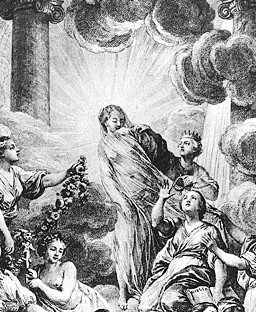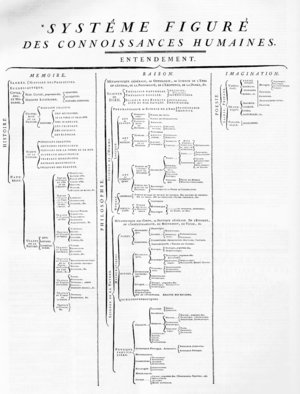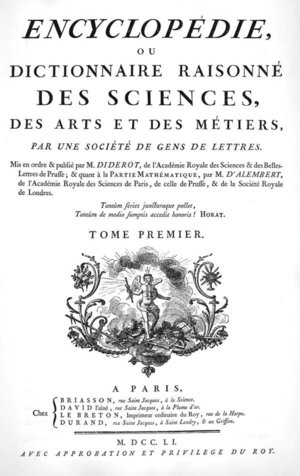|
|
Encyclopédie, ou dictionnaire raisonné des sciences, des arts et des métiers ("Encyclopedia, or Reasoned Dictionary of the Sciences, Arts, and Crafts") was an early encyclopedia, published in France beginning in 1751, the final volumes being released in 1772.
From 1782 to 1832 an expanded edition of the work was published in 66 volumes. That work, enormous for the time, occupied a thousand workers in production and 2,250 contributors. The run of the press was 4,250 copies — a ridiculous number for the present but very large for the 18th century where editions rarely exceeded 1,500 copies.
One of the greatest and most remarkable literary enterprises of the 18th century, the famous Encyclopédie originated in a French translation of Ephraim Chambers's Cyclopaedia, begun in 1743 and finished in 1745 by John Mills, an Englishman resident in France, assisted by Gottfried Sellius, a native of Gdańsk, who, after being a professor at Halle and Göttingen, and residing in the Netherlands, had settled in Paris.
They applied to André Le Breton, the king's printer, to publish the work, to fulfil the formalities required by French law, with which, as foreigners, they were not acquainted, and to ask for a royal privilege. This he obtained, but in his own name alone. Mills complained, and Le Breton had to acknowledge formally that the privilege belonged to John Mills. But, as he again took care not to acquaint Mills with the necessary legal formalities, this title soon became invalid. Mills then agreed to grant him part of his privilege, and in May 1745 the work was announced as Encyclopédie ou dictionnaire universel des arts et des sciences, folio, four volumes with a fifth of plates, and a vocabulary or list of articles in French, Latin, German, Italian and Spanish, with other lists for each language explained in French, so that any article might be found.
Jean Paul de Gua de Malves, professor of philosophy in the College of France, was then engaged as editor merely to correct errors and add new discoveries. But he proposed a thorough revision, and obtained the assistance of many learned men and artists, among were Louis, Condillac, Jean le Rond d'Alembert and Denis Diderot. But the publishers did not think his reputation high enough to ensure success, withheld their confidence, and often opposed his plans as too expensive. Tired at last of disputes and too easily offended, de Gua resigned the editorship.

The publishers, who had already made heavy advances, offered the editorship to Diderot, who was probably recommended to them by his very well received Dictionnaire universel de medicine, Paris, 1746-1748, fol. 6 vols. It was a translation, made with the assistance of Eidous and François-Vincent Toussaint, of the celebrated work of Dr Robert James, inventor of the fever powders, A Medicinal Dictionary, London, 1743-1745, fol. 3 vols.
The proposed work was to have been similar in character. De Gua's papers were handed over to Diderot in great confusion. He soon persuaded the publishers to undertake a far more original and comprehensive work. His friend d'Alembert undertook to edit the mathematics.
Mills demanded an account, which Le Breton, who had again omitted certain formalities, refused. Mills brought an action against him, but before it was decided Le Breton procured the revocation of the privilege as informal, and obtained another for himself dated January 21, 1746. Thus, for unwittingly contravening regulations with which his unscrupulous publisher ought to have made him acquainted, Mills was denied the work he had both planned and executed, and had to return to England.
The great work comprised 28 volumes, 71,818 articles, and 2,885 illustrations. D'Alembert left the project before its completion and the last volumes are solely the work of Diderot. Many of the most noted figures of the French enlightenment contributed to the work including Voltaire, Rousseau, and Montesquieu.
The writers of the encyclopedia saw it as destroying superstitions and providing access to human knowledge. It was a quintessential summary of thought and belief of the Enlightenment. In ancien régime France it caused a storm of controversy, however. This was mostly due to its religious tolerance. The encyclopedia praised Protestant thinkers and challenged Catholic dogma. The entire work was banned, but because it had many highly placed supporters work continued and each volume was delivered clandestinely to subscribers.
It was also a vast compendium of the technologies of the period, describing the traditional craft tools and processes. Much information was taken from the Descriptions des Arts et Métiers.

The Encyclopédie played an extremely important role in the intellectual ferment leading to the French Revolution. In 1750 the full title was Encyclopédie, ou Dictionnaire raisonné des sciences, des arts et des métiers, par une société de gens de lettres, mis en ordre par M. Diderot de l'Académie des Sciences et Belles-Lettres de Prusse, et quant à la partie mathématique, par M. d'Alembert de l'Académie royale des Sciences de Paris, de celle de Prusse et de la Société royale de Londres. The title-page was amended as d'Alembert acquired more titles.
The Encyclopédie presented a taxonomy of human knowledge (See fig.3) which was inspired by Francis Bacon's Advancement of Knowledge. The three main branches of knowledge are: "Memory"/History, "Reason"/Philosophy, and "Imagination"/Poetry. Notable is the fact that theology is ordered under 'Philosophy'. Robert Darnton argues that this categorisation of religion as being subject to human reason, and not a source of knowledge in and of itself, was a significant factor in the controversy surrounding the work. Additionally notice that 'Knowledge of God' is only a few nodes away from 'Divination' and 'Black Magic'.
Contributors
Notable contributors to the Encyclopédie including their area of contribution (for a more detailed list, see List of contributors to the Encyclopédie):
- Jean le Rond d'Alembert — editor; science (esp. mathematics), contemporary affairs, philosophy, religion, among others
- André Le Breton — chief publisher; printer's ink article
- Étienne Bonnot de Condillac — philosophy
- Daubenton — natural history
- Denis Diderot — chief editor; economics, mechanical arts, philosophy, politics, religion, among others
- Baron d'Holbach — science (chemistry, mineralogy), politics, religion, among others
- Chevalier de Jaucourt — economics, literature, medicine, politics, among others
- Montesquieu — part of the "goût" article (English: concept of taste)
- Jean-Jacques Rousseau — music, political theory
- Anne Robert Jacques Turgot, Baron de Laune — economics, etymology, philosophy, physics
- Voltaire — history, literature, philosophy
Statistics
Approximate size of the Encyclopédie:
- 17 volumes of articles
- 11 volumes of illustrations
- 18,000 pages of text
- 75,000 entries
- 44,000 main articles
- 28,000 secondary articles
- 2,500 illustration indices
- 20,000,000 words in total
Print run: 4,250 copies (note: even single-volume works in the 18th Century seldom had a print run of more than 1,500 copies)
Quotes
- "Reason is to the philosopher what grace is to the Christian... Other men walk in darkness; the philosopher, who has the same passions, acts only after reflection; he walks through the night, but it is preceded by a torch. The philosopher forms his principles on an infinity of particular observations. He does not confuse truth with plausibility; he takes for truth what is true, for forgery what is false, for doubtful what is doubtful, and probable what is probable. The philosophical spirit is thus a spirit of observation and accuracy." (Philosophy article, Diderot)
- "If exclusive privileges were not granted, and if the financial system would not tend to concentrate wealth, there would be few great fortunes and no quick wealth. When the means of growing rich is divided between a greater number of citizens, wealth will also be more evenly distributed; extreme poverty and extreme wealth would be also rare." (Wealth article, Diderot)
- "See Cannibalism" (Entry for eucharist) (A notorious example of subversiveness on the part of the authors)
Literature
- Jean d'Alembert by Ronald Grimsley. (1963)
- The Encyclopedists as individuals: a biographical dictionary of the authors of the Encyclopédie by Frank A. Kafker and Serena L. Kafker. Published 1988 in the Studies of Voltaire and the eighteenth century. ISBN 0-7294-0368-8
- Encyclopédie ou dictionnaire raisonné des sciences, des arts et des métiers, Editions Flammarion, 1993. ISBN 2-080704265
Facsimiles
Readex Microprint Corporation, NY 1969. 5 vol The full text and images reduced to 4 double-spread pages of the original appearing on one folio-sized page of this printing.
Later released by the Pergamon Press, NY and Paris with ISBN 0800-0901-05-0
External links
- On-line version (http://portail.atilf.fr/encyclopedie/) (in French)
- Encyclopédie collaborative translation project (http://www.hti.umich.edu/d/did/), currently contains a rather small but growing collection of articles translated into English (253 articles as of April 2005).da:Encyclopédie
de:Encyclopédie ou Dictionnaire raisonné des sciences, des arts et des métiers es:L'Encyclopédie eo:Encyclopédie ou dictionnaire raisonné des sciences, des arts et des métiers fr:Encyclopédie ou dictionnaire raisonné des sciences, des arts et des métiers it:Encyclopédie ja:百科全書 pl:Wielka Encyklopedia Francuska pt:Encyclopédie ru:Энциклопедия, или толковый словарь наук, искусств и ремёсел sl:L'Encyclopédie

